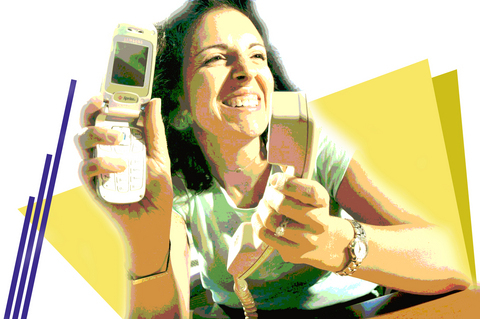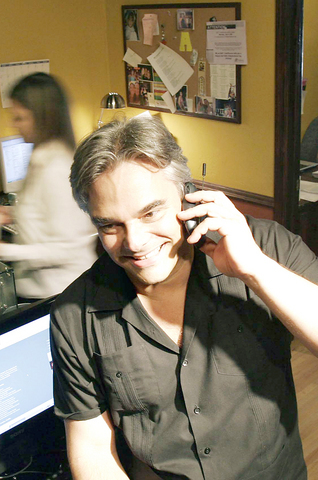Fernando Zulueta has an opinion on the use of cellphones at work: He loves it. Zulueta, 46, who owns a chain of charter schools in South Florida, scratches out the land-line number on his business cards so people won't use it to call him. If he is in a business meeting and his cellphone rings, he often picks it up, even though he considers such behavior annoying.
"I regret to say it," he said, speaking over one of his several cellphones, "but you see your caller ID flashing, and it happens to be a mayor or a state representative, and you say, `I'm sorry, I really have to take this call,' and you take it."
But it doesn't have to be a mayor. Recently, Zulueta interrupted a meeting to take a call from a bed deliveryman: "I like to be accessible. And I see things moving faster and faster in that direction." He said he is frustrated by people who have his cell number but call his land line anyway. "They feel they can only call the cell in an emergency," he said sadly.

Robin Reinhardt also has an opinion on cellphones at work: She hates them. Reinhardt, a vice president in charge of booking guests on MTV, prefers that people think they can call her cellphone only in an emergency. People who call her cell thinking it's more direct than going through her assistant annoy her no end.
"I'm here at my desk with three lines ringing, and people call me on my cell," she said, speaking over a land line from Los Angeles. "I get crazy."
In the great American debate about cellphone etiquette, some of the early turf battles seem to be settled, with winners and losers falling into camps familiar from Western Civ classes. Movie theaters, funerals and libraries appear to have been carried by the cell Rousseauists, who believe the social contract forbids such things as shouting intimate details into a piece of plastic in a room full of strangers.

PHOTO: NEW YORK TIMES
Public transportation systems, on the other hand, appear to belong to the cell Hobbesians, who believe that since life is solitary, poor, nasty, brutish and short, there's no need to give the rider engrossed in her newspaper in the seat next to you a quiet commute. Restaurants constitute a middle ground, in a state of detente. Everyone knows it's rude to use a cellphone at dinner, but civilized people do it anyway.
The workplace, though, remains unsettled territory. "This is the next area," said Peggy Post, director of the Emily Post Institute and an author of The Etiquette Advantage in Business. Post, who often lectures business groups about cell use, spoke over a land line from her home office on the Florida Gulf Coast.
"We're hearing more and more stories about cellphones in the workplace," Post said, with no suggestion that any of those stories might be celebratory.
The points of friction, as Post and others describe them, are numerous: the executive who takes a cell call in the middle of a meeting; the phones that blast impossible-to-ignore ring tones in a busy office; the seminar leader who interrupts his speech to take a call on his cell; the co-worker who, like clockwork, answers hers to discuss lunch choices with a child.
Reinhardt's list of cellphone abusers includes her fiance and even her broker. "I've told him a thousand times," she said. "`Call me on my work phone.' He calls on the cell. I see his number flash, and I don't answer it. Ten minutes later he calls me on my work number."
Rebecca Hastings, the director of the information center at the Society for Human Resource Management, said: "Right now, cellphones are the cigarettes of this decade. It's an addiction. And just like cigarettes are banned from some places, so are cells banned. I think we'll see more organizations take a firmer line."
Unlike many new technologies that are beloved by users but resented by everybody else, cellphones are considered a nuisance even by the people who embrace them. A recent University of Michigan poll of 752 adults found that 6 of 10 users found public cell use "a major irritation."
Last year the Society for Human Resource Management surveyed 379 human resource professionals and found that 40 percent of their companies had formal policies governing cellphone use at work. The policies range from regulations about driving and dialing to limits on the use of personal cellphones in the office.
One reason office cell etiquette is so scattered is that different people use the phone differently. Some people flaunt their cellphones at work to show how important they are, said Hastings, whose office takes 400 calls a day for help with workplace issues. "In some office cultures, the more calls you get, the more powerful you seem," she said.
Others use the cell as an alternative communications network for the people they really want to talk to -- children, paramours, baby sitters, plumbers, gurus -- while the land line carries all the calls they want to screen out. "People tend to give their cellphone number out less frequently, and it's not printed in a phone book," Hastings said. "So they feel it's a little more direct to them. Whereas the desk phone, anybody could be calling you."
To an extent this is changing, users said. As cells embed themselves deeper into people's lives, it is only natural that cellphone numbers have become less exclusive. Most people
contacted for this article said they had long ago crossed the line where they used the cell like a Batphone for emergency calls only.
But this blurring of lines between business and personal use only makes cell use harder to regulate, said Paul Levinson, chairman of the department of communication and media studies at Fordham University and author of Cellphone: The Story of the World's Most Mobile Medium and How It Has Transformed Everything!
"It's a principle of media evolution that media are extensions of our bodies and personalities," he said. "Prior to the cellphone, the way we dressed communicated who we were in the workplace. Now, what ring tone someone has, how often the cellphone rings, how we respond to it when it rings. These are defining personality types in the office, which makes them harder to regulate than matters that aren't part of our bodies and psyches." Levinson, who spoke over a land line, said he sometimes takes calls during his media classes, but only if the conversation will edify his students.
Neil Gailmard, an optometrist in Munster, Indianna, said that two or three patients a day receive calls on their cellphones while he is treating them, despite a sign in his office asking patients to turn their phones off.
Gailmard said he was even more disturbed by doctors who take calls while seeing patients, but said he was not surprised. "I think it's rude. But what actually happens in doctors' offices is very different from what should happen."
Even while cell etiquette in the workplace is divided into the Rousseau and Hobbes schools, devices like camera phones and BlackBerries -- which let people read and send e-mail while they're supposed to be paying attention to a conference call -- are raising new questions about what is and isn't appropriate behavior at work. Two current television ads for camera phones show people using the phones to humiliate or blackmail colleagues. Needless to say, Post found this a breach of good manners. "They make most people uneasy," she said.
Hastings is of like mind. "Just as you dress for success," she said, "you need to manage your gadgets for success."

May 26 to June 1 When the Qing Dynasty first took control over many parts of Taiwan in 1684, it roughly continued the Kingdom of Tungning’s administrative borders (see below), setting up one prefecture and three counties. The actual area of control covered today’s Chiayi, Tainan and Kaohsiung. The administrative center was in Taiwan Prefecture, in today’s Tainan. But as Han settlement expanded and due to rebellions and other international incidents, the administrative units became more complex. By the time Taiwan became a province of the Qing in 1887, there were three prefectures, eleven counties, three subprefectures and one directly-administered prefecture, with

It’s an enormous dome of colorful glass, something between the Sistine Chapel and a Marc Chagall fresco. And yet, it’s just a subway station. Formosa Boulevard is the heart of Kaohsiung’s mass transit system. In metro terms, it’s modest: the only transfer station in a network with just two lines. But it’s a landmark nonetheless: a civic space that serves as much more than a point of transit. On a hot Sunday, the corridors and vast halls are filled with a market selling everything from second-hand clothes to toys and house decorations. It’s just one of the many events the station hosts,

Two moves show Taichung Mayor Lu Shiow-yen (盧秀燕) is gunning for Chinese Nationalist Party (KMT) party chair and the 2028 presidential election. Technically, these are not yet “officially” official, but by the rules of Taiwan politics, she is now on the dance floor. Earlier this month Lu confirmed in an interview in Japan’s Nikkei that she was considering running for KMT chair. This is not new news, but according to reports from her camp she previously was still considering the case for and against running. By choosing a respected, international news outlet, she declared it to the world. While the outside world

Through art and storytelling, La Benida Hui empowers children to become environmental heroes, using everything from SpongeBob to microorganisms to reimagine their relationship with nature. “I tell the students that they have superpowers. It needs to be emphasized that their choices can make a difference,” says Hui, an environmental artist and education specialist. For her second year as Badou Elementary’s artist in residence, Hui leads creative lessons on environmental protection, where students reflect on their relationship with nature and transform beach waste into artworks. Standing in lush green hills overlooking the ocean with land extending into the intertidal zone, the school in Keelung